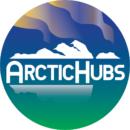Reflecting on a gathering of minds: the ArcticHubs annual meeting in Alagna Valsesia, Italy
Nestled within the scenic embrace of the Italian Alps, the annual ArcticHubs meeting in Alagna Valsesia unfolded as a testament to collaborative research and shared ambitions. Hosted by the University of Turin, this meeting brought together a diverse group of experts, researchers, and practitioners committed to the study and sustainability of Arctic and Alpine regions. Upon our arrival, we were introduced to the picturesque mountain village of Alagna by professor …
